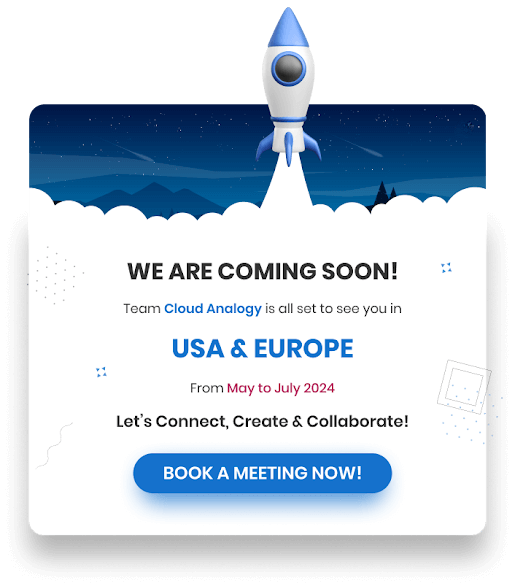Sharing is caring!
It is no secret that healthcare organizations lag behind other industries with respect to technology adoption, and embracing the cloud is certainly in that category. In the past, healthcare providers faced many challenges such as security and ROI from their current IT infrastructure as they instigate their journey of moving to a cloud model.
Healthcare IT leaders have already started to overcome two of the big arguments they’ve had against moving to the cloud. Along with this, they have also recognized various advantages to the cloud that isn’t achievable with on-premise solutions.
Although many challenges have contributed to the slow adoption of cloud, there are equally as many benefits for providers to embrace this new technology across the enterprise. Cloud computing offers many advantages in the healthcare domain. such as reducing operational costs for healthcare providers such as hospitals and clinics, superior data security, processing of large datasets, and more.
In this blog post, we will analyze why cloud computing is an appealing choice for the medical field and how it supports the efforts to improve patient care, increases resource availability, and boosts interoperability while lowering the costs.
Top 6 Benefits of Cloud Computing for Healthcare
Data Storage Capacity
Cloud storage options have become increasingly popular in health care in recent years. The health care organization deals with massive amounts of data and even the most complex hardware installations cannot handle everything.
Cloud data storage options provide a flexible and scalable environment at a lower cost than on-premise deployments. Cloud-based data storage allows organizations to purchase more storage space as needed, rather than investing in additional on-premise servers.
Cloud networks allow health professionals to store all the data they use outside the company to avoid the costs and burden of physical server maintenance.
Cloud computing introduces the practice of implementing remote servers hosted on the internet that enable health care professionals to store files and applications on remote servers, rather than establishing an on-site data center with servers or hosting the data on a personal computer. This helps organizations stay more safe and secure because they don’t need to depend on end-users to upgrade their tools.
Security of Health Data
Indeed, data security is one of the biggest concerns for health IT professionals because cyberattacks are becoming more complex and widespread due to malicious threats. Patient data is sensitive in nature and cloud-hosted healthcare data needs to be protected from external cyber threats.
Encryption of data by using security keys for access and using blockchain for securing data are some of the ways healthcare organizations can ensure the security of sensitive patient data stored in the cloud.
With the public cloud, entire teams can focus solely on security and can ensure improved data security. Public cloud infrastructure offers greater security and the ability to keep pace with changes in the threat landscape.
Health care providers have been able to outsource data storage and security to HIPAA-compliant cloud storage services. Cloud computing has helped to ensure that every health care provider can access a data storage solution that will adequately protect the patient’s sensitive information.
Easier access to their own records
When data and applications are stored on the cloud, patients must be able to easily track their own data easily and facilitate the exchange of information without going through so many loops.
Healthcare functionality and services can be improved by cloud-based healthcare IT systems that offer the potential for broad interoperability and integration. Health Cloud services can enable remote access to applications and data via the Internet using wired and wireless systems.
Better coordination with insurers
With cloud storage, keeping up to date on insurance policies, accepting, and processing insurance becomes both easier and more effective. The cloud computing features can also help support the healthcare IT technologies being used in the industry today including, electronic medical records, patient portals, mobile apps, medical devices with IoT technology, and big data analytics.
Cloud Computing has emerged as the innovative information technology platform and revolutionized the nature of clinical research, with enhanced support for knowledge-sharing and clinical trial management.
Better Environment for Innovation
In addition to security and operating costs, public cloud infrastructure offers a lot of benefits that help organizations collaborate seamlessly from a single point of engagement and deliver personalized experiences that exceed patient expectations.
Cloud Computing applications can be built faster using a variety of services offered by large providers of public cloud infrastructure.
For instance, healthcare advances in machine learning will require the capabilities and services available via the cloud, including unlimited computational power and sophisticated machine learning frameworks.
Elasticity in the Cloud
With the advanced computing power of the cloud, processing large amounts of data becomes easier. This enables unlimited data transfer between various stakeholders, accelerating the delivery of healthcare, and increasing process efficiency.
Cloud computing makes it easy for medical professionals to communicate with patients on any device and collaborate across the healthcare network, from care coordinators to service workers and family members.
Conclusion
Cloud-based solutions are becoming increasingly attractive to the healthcare industry in terms of reducing IT costs, support on-demand provisioning, and more diversified infrastructures, as well as a higher level of flexibility and security.
With cloud computing, healthcare providers can handle enormous workloads without compromising data integrity and security. If you have further questions about cloud computing and want to know if it is the right fit for your company, please don’t hesitate to contact us.
Explore how the teams of Salesforce Health Cloud experts at Cloud Analogy can assist you with planning, implementation, integration, consulting, deployment, data migration, EHR data integration, and more.

Sachin Arora
Scrum Master and Principal Solutions Architect
Sachin, a renowned Scrum Master and Principal Solutions Architect at Cloud Analogy, has rich experience when it comes to working on process improvement in a fast-paced environment maintaining high level of quality in all deliverables. Sachin's expertise lies in varied hardware and software environments including Cloud technologies such as Salesforce, AWS, Cloud Foundry & Google App Engine and Mobile.Hire the best Salesforce Development Company. Choose certified Salesforce Developers from Cloud Analogy now.







